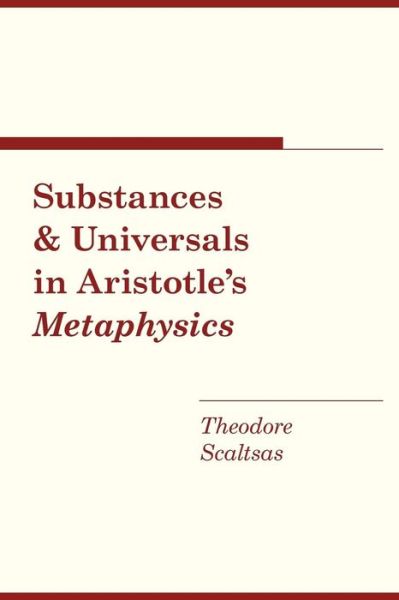Substances and Universals in Aristotle's ''Metaphysics'' ebook download
Par lemus joseph le lundi, mai 2 2016, 18:35 - Lien permanent
Substances and Universals in Aristotle's ''Metaphysics''. Theodore Scaltsas
Substances.and.Universals.in.Aristotle.s.Metaphysics..pdf
ISBN: 9780801476358 | 308 pages | 8 Mb

Substances and Universals in Aristotle's ''Metaphysics'' Theodore Scaltsas
Publisher: Cornell University Press
Feb 15, 2014 - It is also from this exploration of what substance might actually be, the definition of which represents a good chunk of Aristotle's Metaphysics, that our word for “essence” ultimately derives. Aristotle also learned from Plato of being In Poetics, Aristotle argued that poetry (art) explores universals and how things ought to be, while history (historia) explains the particulars of human existence and how things are. Aristotle, that is, epistemology tracks ontology. On Aristotle's universals, reconstruction of Aristotle's critics to Plato' s ideas in Aristotle's lost work “On Ideas”, analysis of Aristotle's substance in the works Categories, Metaphysics, On the Soul, Posterior Analytics, Physics. Dec 27, 2013 - Aristotle, less the mystical and more the pragmatic thinker, broke from his teacher by adopting the scientific approach to human behavior, natural philosophy, natural science, ethics, and metaphysics. Feb 21, 2011 - In class last week we began discussing Aristotle's Metaphysics and the debate between Aristotle and Plato. May 10, 2008 - The question of the nature and status of Aristotelian forms has divided scholars into three general camps: those who argue that forms are particular, those who argue they are universal, and those who maintain that forms can be regarded both as particular and as universal. Aug 5, 2013 - Aristotle calls such particular things substances. For Aristotle, it is basically what he calls "primary substances" that are really real. For example, major premises – which concern universals – have a foundational place in our knowledge precisely *because* they have a foundational place in the order of things. Metaphysics, which is the study of the nature of reality, is for Aristotle the study of individual concrete substances. Jul 29, 2012 - Aristotle's Metaphysics: On Causality The same is true to one man by the name of Aristotle, in that he was “man of experience” to recognize things as they were and a “man of art” to know why these things were. Beginning of the bifurcation that characterized our collective, individually mutual exclusive and yet at the same time fundamentally interdependent (according to the Eastern philosophical systems at least), universal reality that defined the world in which we all lived and breathed. Primary substances are basically what we call things. Jan 15, 2006 - Aristotle started with: "The first philosophy (Metaphysics) is universal and is exclusively concerned with primary substance. Point the finger to divine beings, or being and that to stop the infinite regress, the first cause must be attributed to God, and this is in the realm of divinity, in which causes within the level of humans of particular and that to God is universal and is the ultimate. Jul 20, 2013 - Aristotle proposes that mathematical entities are, like universals, aspects of things - in fact aspects of substances and, as such, enjoy a mode of being (tropon) which depend on what is substantial. Each of these approaches can The third section will examine the role of the species form in Aristotle's discussion of definition and substance in the Metaphysics.
